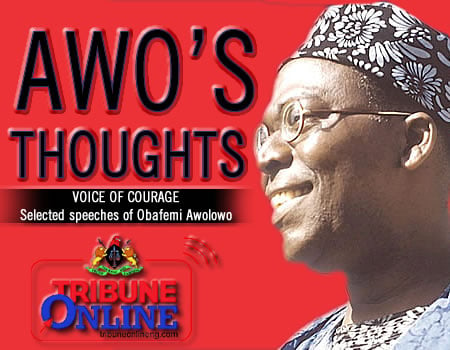CONTINUED FROM LAST WEEK
THE psychological effect ofall this on Northern minds has been complex, baffling, and dangerous. In their dealings with their fellow-citizens from the South, they sometimes evince feelings of inferiori’ty or superiority, all depending on particular individuals and circumstances. They regard Western education with contempt and as only a workman’s indispensable tool. But they betray an fnexplicable hostility and resentment towards Southerners for being too far ahead of them in Western education. Since 1947 when the voices of Northern spokesmen were first heard in the affairs of Nigeria, they have persistently demanded, either by word OJ by conduct, that the South should be halted in its progress until the North is able to catch it up. On occasions, some ambitious Southern politicians have also lent support to this manifestly perverse and exceedingly harmful suggestion.
By 1830, the Fulani conquest of the North, which began around 1804, was complete. But the lofty religious ideals which inspired the Jihad had suffered serious corrosion. The Fulani Rulers, who had imposed themselves on the people after the conquest, had become more corrupt, more oppressive, more extortionate, and more tyrannical than the indigenous rulers whom they had supplanted and replaced. In particular, their slave-raids were conducted on a more inhuman and bloody scale, and were only stamped out by the armed forces of the new imperial power under Lugard.
Those of the Fulani Rulers who pledged their loyalty to the British were retained on their thrones, whilst those who did not were forcibly deposed and replaced by other amenable Fulanis.
In other words, one of the things which the advent of the British did to Nigeria was to entrench another alien rule in the North. Historically, the Moslem Fulanis had a long record of erudition and administrative competence. They had occupied the posts of professional administrators under many native rulers in Guinea, Senegal, and Hausa territories. Consequently, the British did not bother themselves about the legality ofFulani rule in the North. The immediate objective was to maintain law and order, and have an effective government. For these purposes, and having regard to all the prevailing circumstances which we have previously noted, no better administrative machines or tools than the experienced and fanatical Fulani Rulers could be conceived or contrived. Accordingly, all the Fulani Emirs were regarded as the de facto Rulers of the North, and subsequently recognized as the de jure Paramount Chiefs or Traditional Rulers of their respective territories.
Under the ‘Indirect Rule’ system, these Paramount Chiefs were to administer the affairs of their respective domains, subject only to the guidance of the Resident. In the words of Lugard himself, ‘the attitude of the Resident is that of a watchful adviser not of an interfering ruler.
In so doing, the British gave their authoritative and unassa lable backing, and a new lease oflife, to a subordinate alien rule whiie within a century of calculated misrule, had degenerated into an unstable and tottering despotism. The British had, it is true, removed the more revolting edges and asperities ofthe Fulani rule, such as slave-raids, slavery; extortions, execution for minor offences sometimes without proper trial, etc. But they had allowed the Fulani despot to have absolute sway as before, and to reign under more secure and more affluent auspices. From the very start, that is in 1900, the Sultan ofSokoto, the Shehu ofBornu, and the Emir of Kano were each placed on a fixed salary of £6,000 per annum, plus a yearly establishment allowance of £3,000 for the Sultan and of £ 1 ,500 for each of the other two. All the other Emirs in the North were also placed on fixed salaries and allowanc7s, which, though smaller, were equally extravagant.
Having regard to the present general standard of living among the masses of the people, these salaries and allowances are, to say the least, indefensible even today. They were much more so in 1900; and if the full facts had been publicly known in the South at the time, the educated Nigerian nationalists of Southern origin . would have kicked up a mighty row. The British knew this, and they therefore saw to it that the North was hermetically sealed to Southern Nigerian nationalists. Nigerian lawyers, who were the champions of the rule oflaw in those days, had no locus standi in the courts ‘operating in the North. They, therefore, had no incentive to travel the long distance to an unknown and reputedly hostile territory. Other educated self-employed Southerners were discouraged from visiting the North. No Nigerian, however highly placed, was allowed to travel in a compartment higher than Third Class on the railways. In the early twenties, a barrister, by name Kolawole Doherty, who made a courageous attempt to visit the North, apart from not being permitted to travel in the train class of his choice, ~as beaten up severely at Zaria Railway Station, and, was obliged to return to Lagos from that station inmost humiliating circumstances, without reaching his destination; Kano, Although strong representations were made to the Government in L~gos, the only reply received was: ‘the matter is being investigated.’ And that was the end of the matter.
CONTINUES NEXT WEEK
YOU SHOULD NOT MISS THESE HEADLINES FROM NIGERIAN TRIBUNE
Buy and read digital replicas of your TRIBUNE titles by subscribing through E-VENDING
President Buhari’s Full Democracy Day Speech
Fellow Nigerians,The 2020 celebration of Democracy Day marks 21 years of uninterrupted civil administration in our dear country. This day provides us an opportunity to reflect on our journey as a nation, our achievements and struggles.
It is a day to honour our founding fathers who toiled to establish our republic and every Nigerian who has worked tirelessly to sustain it… Read full story
Democracy Day: NADECO lists 12 conditions to unity, peace •Insists on return to federalism
TWENTY-ONE years after it led the struggle that culminated in the restoration of civil rule, the National Democratic Coalition (NADECO) on Thursday declared that Nigeria remained in dire straits. Accordingly, it listed about 12 fundamental conditions, including a return to federalism, coupled with the convocation… Read full story
Governance: Our best not good enough since 1999 —Atiku
EFFORTS by Nigerian leaders to govern the country rightly since 1999 have not been “good enough to improve on the lives of the citizenry and grow the nation in all facets of development needs,” former vice president, Alhaji Atiku Abubakar, has said… Read full story
ASUU Challenges FG To Provide Proofs It Saved Money Through IPPIS
The Academic Staff Union of Universities (ASUU) has again challenged the Federal Government to present to the public a verifiable proof that it has saved huge amounts of money through its newly introduced Integrated Personnel and Payroll Information System (IPPIS) for workers… Read full story
Reps Increase 2020 Budget From N10.805trn To N10.810trn
The House of Representatives on Thursday passed a resolution to increase the revised 2020 budget from N10.806 trillion to N10.810 trillion. The resolution was passed after the adoption of a debate on the motion sponsored by the chairman, House Committee on Finance, Hon Abiodun Faleke, who underscored… Read full story
COVID-19: Reject Patients, Have Your License Withdrawn, FG Threatens Medical Doctors
The Federal Government on Thursday threatened to withdraw licenses of medical doctors who deliberately reject and turn back patients from their hospital without attending to them or offering necessary advice on what to do. Describing it as unethical and unacceptable, the Minister of Health, Dr Osagie Ehanire, while speaking… Read full story
Reopen Schools For SS3 Students First, Proprietor Tells FG, WAEC
A school administrator and principal of Adesina College, Ibadan, Mr Adejare Adesina, has advised the Federal Government to liaise with the West African Examination Council (WAEC) and other West African countries that subscribe to the council’s examinations to reopen schools for all the Senior… Read full story
COVID-19 Lockdowns Deny 500m Children Access To Education ― IMF
Over 500 million children all over the world have lost access to education as a result of the lockdown occasioned by the COVID-19 pandemic, the International Monetary Fund (IMF) said on Thursday. The IMF Managing Director, Kristalina Georgieva, said in a statement that “More than half a billion children worldwide have… Read full story
Nigeria Is 3rd Worst Country On Child Marriage Index
United Nations Children Fund (UNICEF) has said that with a figure of 3.5 million, Nigeria has the third-highest absolute number of child brides in the world and the 11th highest prevalence rate of child marriage globally. Tribune Online reports that only Bangladesh with 4.4 million and India with 15.5 million child brides are… Read full story
Anxiety Over More Deaths, Rising Cases Of COVID-19 In Nigeria
THE geometric rise in the number of confirmed cases of COVID-19 and the increasing casualties arising from the infection have continued to raise concerns among Nigerians. The deadly virus is still running riot despite concerted efforts to curtail it, crippling many facets of the economy as it passes the first 100 days of… Read full story
Senate Threatens To Issue Warrant Of Arrest On Heads Of MDAs
The Senate has threatened to issue warrants of arrest on some ministries department and agencies of government over failure to appear before it and respond to queries by the Auditor General of the Federation. Tribune Online reports that the threat follows the refusal of the agencies of government to honour the invitation of… Read full story
June 12: A Milestone For Democracy – Tinubu
The election of June 12th 1993 changed Nigeria profoundly. That it would have this deep and positive effect was not always certain. Many people laboured, struggled and sacrificed for democracy. They fought not that we would have democracy day but that Nigeria might exist as a democracy every day. When I say democracy… Read full story
EDITORIAL: Defence Minister’s Lamentation
THE Minister of Defence, Bashir Magashi, has lamented that Nigeria’s military is too understaffed and underfunded to tackle the various security challenges facing the country. He made this lamentation while briefing journalists after a Federal Executive Council (FEC) meeting where he said he had made a presentation on… Read full story






